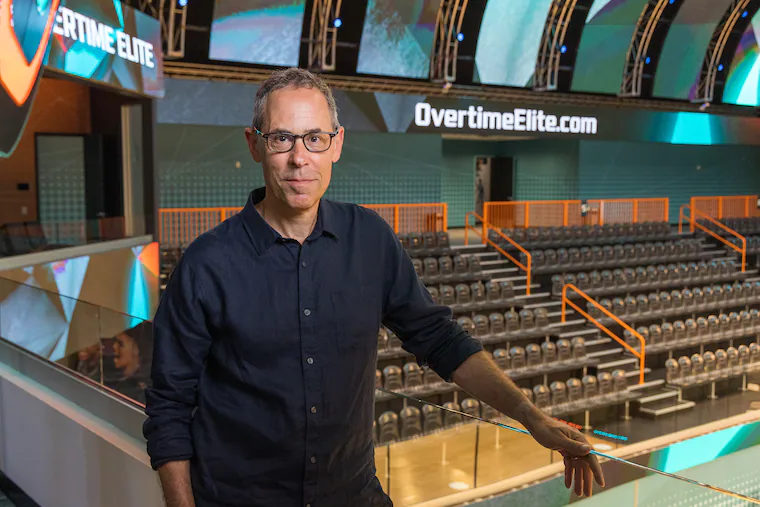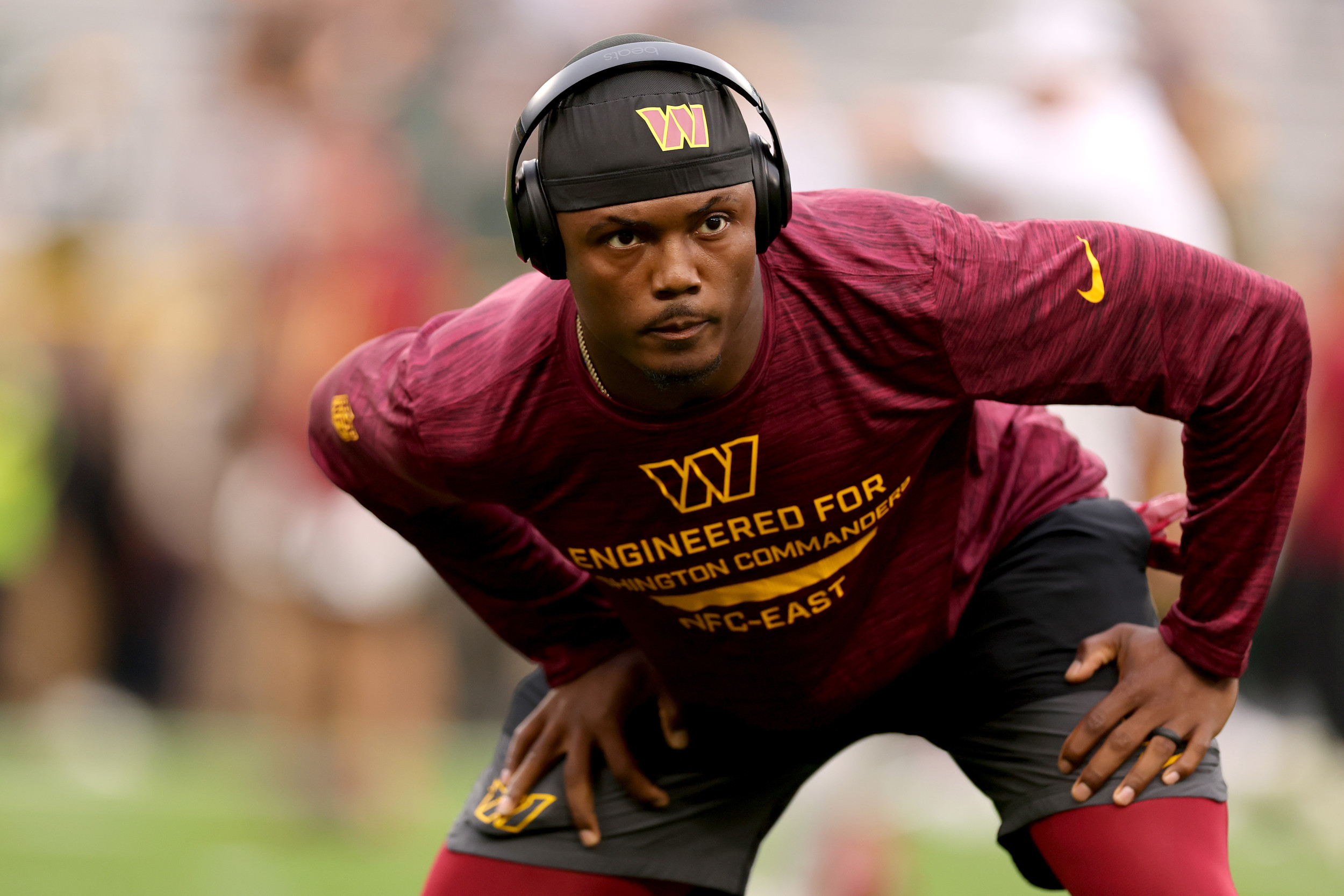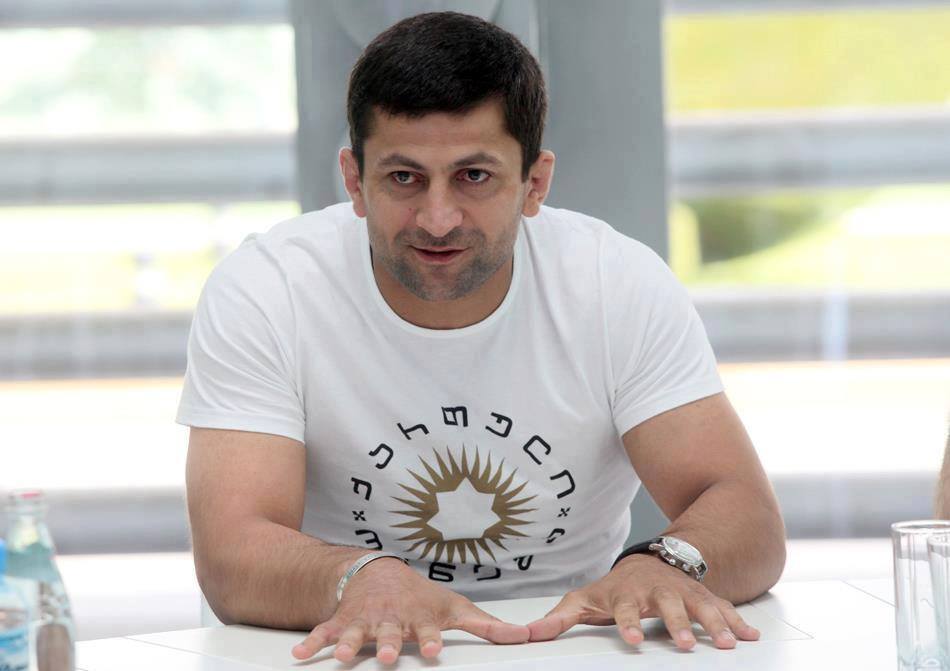How Ardmore’s Dan Porter grew Overtime Elite into a national high school basketball destination

In 2016, Dan Porter found himself sitting in a plush, spacious William Morris Endeavor glass office in Manhattan, overlooking Madison Square Park, crushed over missing a great play his son made the previous night during his grade school basketball game.
Fortunately, Porter was able to see a video of the play on his cell phone that was forwarded to him by his son. Then a thought struck Porter: “There was something missing for these kids. Where was their platform for creativity, where was their version of what the world looks like to them?”
Eighteen months later, Porter left his job with Endeavor and sat in a cramped rented room in SoHo broken up by office dividers with four others brainstorming what Porter’s new idea could be. He wanted to create an outlet in which people could see young rising stars play basketball, along with being able to express their unique personalities. He fulfilled that vision with the launch of Overtime, a digital sports media company that produces and distributes content on social media.
Porter, 59, an Ardmore native and a Friends’ Central and Princeton graduate with a degree in history, started Overtime with a bunch of interns running around taking videos at legendary basketball parks in New York City.
What they noticed was that the posted videos of the lesser-known players were getting greater attention than those of some of the ranked players on YouTube and social media.
That was the impetus of Overtime Elite (OTE), the creation of Porter and Zack Weiner, a basketball league that pays players 17 to 20 years old a minimum salary of $100,000 annually. OTE, which was founded in 2021 and has an estimated worth of more than $500 million, crossed the $100 million threshold in yearly revenue for the first time in 2024.
The media platform has since branched out from its men’s basketball league to OTX, a boxing stream provider. There also are Overtime Select, a new women’s basketball league featuring 64 of the top female high school players, and OT7, a seven-on-seven summer football league. The latter has a media rights deal in which games are shown on the NFL Network and NFL+. La Salle’s Notre Dame-bound Joey O’Brien and Missouri-bound Gavin Sidwar were on one of those teams this summer.
Untapped landscape
OTE, modeled after European youth soccer academies, grew from the original idea of Overtime: filming games in high school gyms, where no filming rights fees were involved. Porter’s venture did not have to elbow its way through the web of network titans constantly jockeying to sign major pro and college sports league deals.
Overtime — and Porter — found an untapped landscape.
“We knew someone that got us a meeting at ESPN to pitch the idea,” Porter recalled. “We pitched future basketball stories and young people. We wanted to know if ESPN would be interested in a partnership. The ESPN rep said, ‘Sure, this is our website. Where do you fit in? Are you high school basketball?’ We told them, ‘No, not really. It is about the players.’ They asked if this was about recruiting. It was not about recruiting. As it turns out, as we are sitting in this conference office at ESPN, our model did not fit anywhere. There was no construct that ESPN had that described what we had. In that moment, we realized this was our opportunity.
“Everyone else had chopped up the high school sports world into recruiting and player rankings, and we were about the beauty and culture of young people. We understood what we had was special.”
Porter came with a history of spinning straw into gold.
In 1999, Porter and a partner started TicketWeb, one of the first online concert ticketing companies, which he turned over and sold to Ticketmaster for $35.2 million in May 2000. In 2012, he created one of the most downloaded iPhone games, Draw Something, a drawing guessing game, and sold that to the public gaming company Zynga for about $180 million.
From 2013 to 2016, he worked for billionaire Ari Emanuel, the CEO of entertainment giant William Morris Endeavor, and became the head of digital for the agency. Endeavor acquired IMG, a global sports media company that includes IMG Academy, in 2014, and Porter became head of digital there.
» READ MORE: Nick Sirianni was his mentor. Now, Roy-Al Edwards is building a new football program.
“In 2016, when I quit William Morris Endeavor, there was the cusp of this narrative that young people were not watching a lot of live sports,” said Porter, who also is an adjunct associate professor at NYU. “They didn’t participate in sports the way my generation did. I also did not grow up with video games, cell phones, Instagram, and social media. I was in the middle. On one side, there was a YouTuber I represented who reached every young person in America. On the other side, here were all of these sports people trying to reach those people. I understood both sides. In 2016 when I quit, my first idea was what the next generation of ESPN was going to look like.
“The majority of young people focus on social media. They don’t have cable TV. They don’t watch live games. Their behavior patterns were different. The way I looked at it as I don’t listen to the same music my parents listened to, and my children don’t listen to the same music I listened to. Every generation is different. What they listen to, what they wear, and sports felt stuck. Monday Night Football was the same Monday Night Football I grew up with. It became stale. That was my inspiration for Overtime Elite.”
‘Providing another choice’
From 2016 to 2018, Porter and his group began tinkering with what would connect. Culture was important to younger audiences, Porter felt, and the sport most connected was basketball. Younger athletes are evaluated on their future potential and their rankings, whether they are four-star or five-star players, he felt. Porter wanted to veer away from that, focusing more on who these players are.
Overtime launched in November 2016 and OTE started in 2021. The league made immediate strides in basketball, seeing two of its players, twins Ausar and Amen Thompson, who played one year with OTE, selected with the Nos. 4 and 5 picks in the 2023 NBA draft. In 2024 OTE prospects Alex Sarr and Rob Dillingham were taken in the top 10 of the draft.
The OTE Arena is a 110,000 square-foot facility in Atlanta where players train, study, and compete. The building comes with three NBA regulation-size courts that can seat 1,300 spectators and includes a 7,000-square-foot fitness center, a hydrotherapy room, classroom spaces, a dining hall, and locker rooms.
According to Overtime Elite, the company generated $100 million last year from sponsorship deals, media rights deals, licensing partnerships, and e-commerce sales.
At first, there was some pushback, especially from the college basketball world. OTE was paying high school basketball players $100,000 salaries to skip college, before name, image, and likeness deals came into play.
“It was crazy, every college coach in America hated us in the beginning,” Porter said. “We gave everyone in our first two years equity in the company. We invest millions in our players. We educate our players in financial literacy; we don’t charge them. We’re doing things no one has ever done. But it was divisive. One side said, ‘Thank God, someone is empowering college athletes.’ Or … ‘We’re taking away their eligibility.’ No, the NCAA is taking away their eligibility was my reply. We’re paying them because they deserve to be paid. NIL gets approved [in 2025] and we were in the right place at the right time.
“We have a pro day for NBA scouts. We have a college pro day that attracted 350 college coaches in our building last year. Every team in our league participated in that. The college coaches are our best friends.”
Porter says OTE is a basketball league for the best 17-to-20-year-olds in the world. He admits that there is a more complicated ecosystem than high school sports used to be.
» READ MORE: Brad Wanamaker knows about Roman Catholic’s basketball tradition. Now it’s his time at the helm.
“In the beginning, we saw a hole in the market and created market space to connect with an audience, and with the community, we found more opportunity, and we had to go to everyone, and now they are approaching us,” Porter said. “ … We didn’t get into this business because there is something wrong with high school sports. We got into this business because we understood there is a massive audience, and they wanted to see people like themselves. …
“If you are an athlete, the best thing you have is choice. We’re happy to be another choice. We’re like a Juilliard School for basketball. We’re right for some people, and not right for others. We’re providing a platform for exposure and connecting with fans.”
Other Philly flavor
In 2024, a third of the OTE basketball games were shown on Amazon Prime. More than a million viewed the OTE finals last year, according to Porter. This season, more than 100 players scattered across nine teams, from five countries and with 33 based in Atlanta, will compete in the OTE season from Nov. 1 until the finals on the Saturday before the NCAA’s Selection Sunday in March.
One of those players is former Roman Catholic star Tyler Sutton, now of the City Reapers — and one of the coaches who will join him in Atlanta this season is former West Catholic coach Miguel Bocachica.
Sutton, a 6-foot-2 guard, is the first Philadelphia-area player to attend OTE, a company created by a Philly-area guy. Sutton had some questions about going to OTE, but former Roman coach Chris McNesby gave him a gentle push. Sutton, 17, said most of his earnings will be placed in a trust fund. “I was not born in a mansion and stayed with my grandmom in Delaware,” he said. “I chose to do this for myself and my family.
“To be honest, if Coach Chris was still at Roman, there is a chance I would still be at Roman for another two years. I stay in contact with my family every day. This is a big strain off them. I still have intentions to play in college. This is a college environment. I got down here and I was running at 9 in the morning.
“The education is no joke, either. We go to class four, five hours a day and I’m taking shots and working out the rest of the time. This environment will better prepare me for college. This isn’t the first time I have lived away from home. I went to George School my freshman year, under coach Ben Luber [now a Penn assistant]. I know how manage time.”
» READ MORE: Miguel Bocachica on his time guiding West Catholic basketball: ‘I love every bit of coaching’
Sutton stressed, though, that OTE is not for everyone.
“My message is anyone thinking about making this move, you better be ready to work and make a full commitment,” said Sutton, who lives in an apartment complex near the OTE Arena. “We do media things to help our brand, and I’ll do some of that. But my main focus every day is on getting better. If you want to spend your day on social media, and some people my age do, that’s a waste of my time. I was approached by a lot of schools, but OTE showed me more love and I feel I will be more challenged. If you’re doing things you shouldn’t be doing down here, you will be weeded out — fast.”
Initially, OTE reached out to Sutton and Julian Dunkley, who had coached the guard since sixth grade. The pair informed McNesby.
“We were happy with Tyler playing in the Catholic League, but now we are at a stage where basketball is becoming global and these players are being seen,” McNesby said. “We have a great thing going at Roman, but OTE was a good fit for Tyler. I endorsed this. Financially, this helped Tyler and his family and what OTE offered would develop Tyler more. He will get educational support, financial education, and OTE’s focus is to coach these kids for what is ahead. I know places like this peck at top leagues like the Philadelphia Catholic, but the offer at OTE is real.
“For Tyler, this made sense.”
“Chris prepared Tyler for this step, and Chris was a major piece for this move happening,” Dunkley said. “OTE provides opportunity. Tyler is preparing to be a high-level Division I player. OTE is putting him through the rigors for what college will be like. … This experience is preparing him to be a pro at 17. This is wave of the future for kids.”
Bocachica will be an assistant coach on the City Reapers. The first thing the coach noticed during the time he has been at OTE is how intense everything is.
“Basketball is only part of it, because playing major college basketball has become a new world and I don’t think anyone does a better job than OTE preparing these kids holistically,” he said. “These guys are being educated when it comes to NIL deals, how to prepare their bodies, what to eat. Let me remind you, these are teenaged kids, for the most part. Try and tell a 17-year-old to eat right. Think they’re going to listen? You better listen here. You have four, five hours of academics, and the rest of the day you are working on yourself.
“Social media is an absolute role in the OTE model, and building their brands, but being here, I see the work these guys are putting in. This is a great place for someone like Tyler Sutton. This place has everything a Power Six school has. OTE is the perfect route if you see a bigger picture ahead.
“These kids are getting paid to invest in themselves. If you’re at a high level, it’s a deal that you can’t pass up.”



